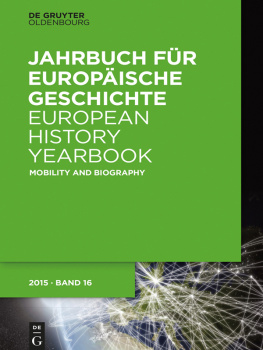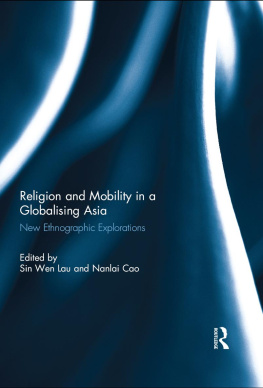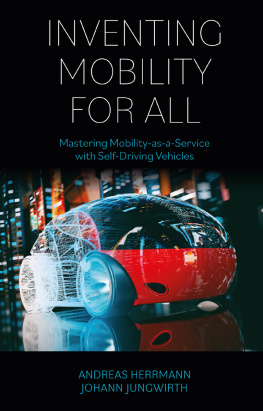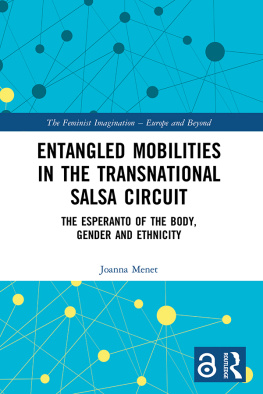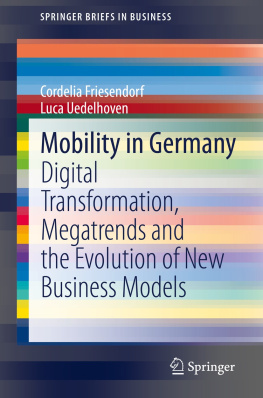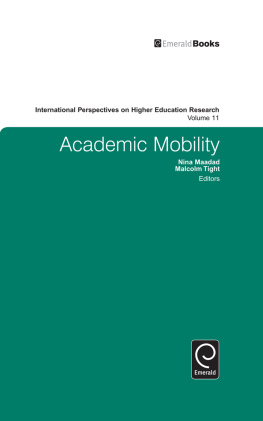Jahrbuch fr Europische Geschichte. European History Yearbook


Herausgegeben am Leibniz-Institut fr Europische Geschichte von Johannes Paulmann in Verbindung mit Markus Friedrich und Nick Stargardt
Grndungsherausgeber: Heinz Duchhardt
Die Online Ausgabe steht unter einer Creative Commons CC BY-NC-ND Lizenz
(vgl. http://creativecommons.org/licenses/by-nc-nd/3.0/de/) .
ISBN 978-3-11-041515-5
e-ISBN (PDF) 978-3-11-041516-2
e-ISBN (EPUB) 978-3-11-042393-8
ISSN 1616-6485
Library of Congress Cataloging-in-Publication Data
A CIP catalog record for this book has been applied for at the Library of Congress.
Bibliographic information published by the Deutsche Nationalbibliothek
Die Deutsche Nationalbibliothek verzeichnet diese Publikation in der Deutschen Nationalbibliografie; detaillierte bibliografische Daten sind im Internet ber http://dnb.dnb.de abrufbar.
2016 Walter de Gruyter GmbH, Berlin/Boston
Titelbild: Harvepino/iStock/Thinkstock
Satz: PTP-Berlin, Protago-TEX-Production GmbH, Berlin
www.degruyter.com
Contents
Sarah Panter, Johannes Paulmann and Margit Szllsi-Janze
Cornelia Aust
Rainer Liedtke
Simone Derix
Nico Randeraad
Lucas Geese, Wolfgang Goldbach and Thomas Saalfeld
Gesa zur Nieden
Alix Heiniger and Thomas David
Robert Brier
Sarah Panter, Johannes Paulmann and Margit Szllsi-Janze
Mobility and Biography: Methodological Challenges and Perspectives
Abstract: This introductory article discusses methodological challenges for and perspectives related to a field of study that has only recently gained importance in historical research: transnational lives. For a long time, methodological nationalism had slowed down or even prevented investigations of individual or collective life-courses that were characterised by a high degree of mobility and internationality. We argue that a critical engagement with concepts from the social sciences related to the current interest in processes of globalisation and transnational phenomena can open up new perspectives on mobility and biography. In doing so, we first explore how focusing on lives that crossed political, social or cultural boundaries can bring aspects of individual agency together with larger structural settings as explanatory factors. In the second part, this article attempts to conceptualise transnational lives for historical research. Introducing our own concept of cosmobilities, we demonstrate how engaging with two sociological strands, rooted cosmopolitanism and mobilities, might provide a fresh impetus for analysing transnational subjects and their practices.
In 1849, Lorenz Brentano, today an almost forgotten activist during the European Revolutions of 1848/49 in the Grand Duchy of Baden, set sail with his wife via Switzerland for the United States. Almost thirteen years later, in 1862, this son of a merchant from Mannheim with family roots in Tremezzo (Lombardy) was finally granted an amnesty. Nonetheless, Brentano, who by then had settled in Chicago and acquired US citizenship, would not return to Germany for good. Only during his term as American consul in Dresden from 1872 to 1876 did he resettle for an extended period in Germany.
a failed revolutionary he had to flee German territory, only to achieve success as a journalist and politician in the US.
This division is problematic because it not only simplifies a lifes course unduly but also because it shows a bias towards national narratives. Analysing such biographies as nationalised lives ignores the transnational dynamics and entangled practices shaping their agency. For such transgressive life stories were not bound to one territory or one nation-state but rather marked by a high level of mobility and internationality, especially if one keeps in mind larger group relations, like family or business networks. Bringing research on aspects of mobility and biography during different epochs and in various spatial dimensions together, this issue of the European History Yearbook intends to open up new perspectives on the emerging field of transnational lives.
Transnational Lives: A New Perspective on Writing Biographies?
The subject of transnational lives has only recently gained importance in historical research, for instance in the study of imperial biographies and careers or diasporic minorities.
history as a discipline has been increasingly marked and reshaped by the so-called transnational turn. What are the main reasons for this hesitant reception, only gradually producing spill-over effects on the analysis and writing of biographies? If we follow the analyses of sociologists, one important reason seems to be that, despite programmatic claims of change, methodological nationalism (Ulrich Beck) or methodological territorialism (Neil Brenner) continues to dominate in the social sciences and, one might add, in the humanities. Hence, it is safe to assume that there are many more hidden transnational lives yet to discover.
The reluctance which has so far been shown to make transnational lives a prominent research subject has also been reinforced by a more general discourse on the merits of the biographical approach itself. Especially among German historians, writing biographies was for a long time overshadowed first by historicism and then by negative connotations the genre of biography carried to later generations of scholars.
the dominance of heroic, great men narratives. Over the last decades, however, and partly due to the cultural turn and its impact on the humanities, biography as a genre has been re-evaluated. The insight has gained ground that one of its strengths is to link the individual with society, thereby turning such biographies into valuable sensors for general trends and changes in society. has emerged that attempts to avoid the pitfalls of past biographies. The writing of transnational lives has to take these recent advances even further, because such an approach must take into account several contexts in which individual and collective lives were entangled.
Conceptualising Transnational Lives for Historical Research
Closely linked to the aforementioned historiographical trends is the heightened interest in the agency of transnational (or global) subjects.
we want to acknowledge the dynamics of their multiple identities and, at the same time, give due consideration to their specific, localised links, with the goal in mind to avoid defining them solely as individuals or groups who crossed boundaries? And given that we do not view them as heroes acting autonomously with regard to larger structural settings, how can we explain their agency in its complexity and ambiguity? Trying to cope with both the methodological challenges as well as the perspectives that manifest themselves in these questions, we propose an approach to mobility and biography that brings two sociological strands rooted cosmopolitanism and mobilities together with a historical research agenda. We subsume this approach under the term cosmobilities. We think that this offers a stimulating impetus for analysing transnational lives. We have developed our own approach initially with dictionaries of national biography in and across Europe in the long nineteenth century in mind but its applicability reaches further in time and space.

